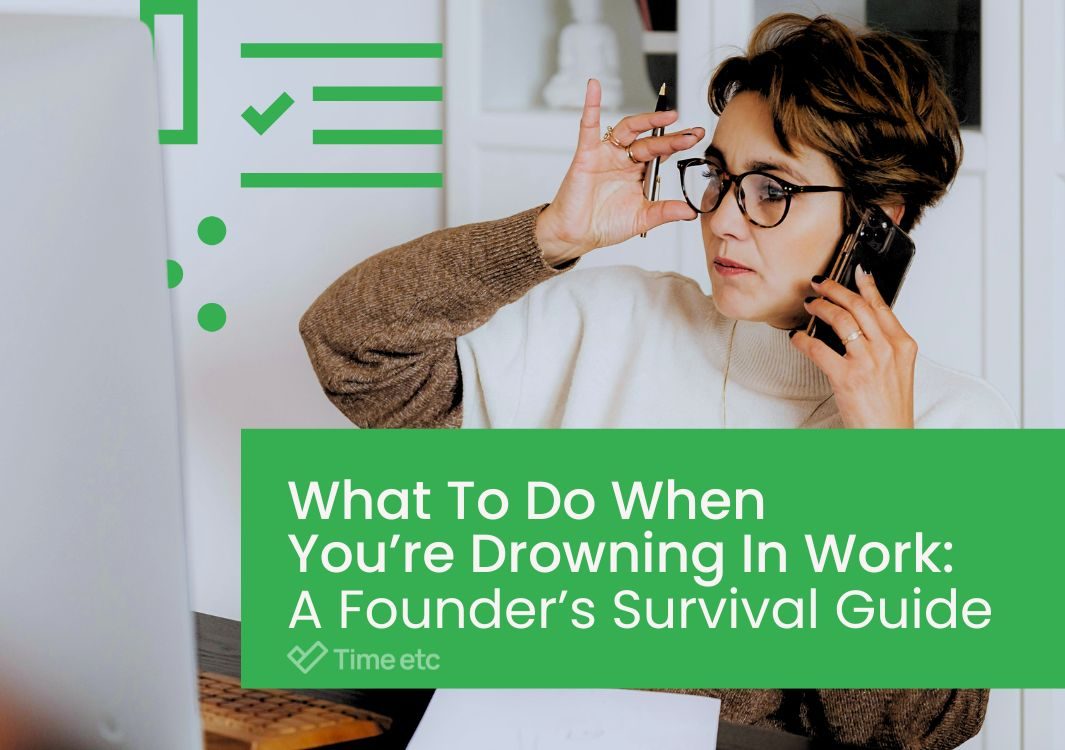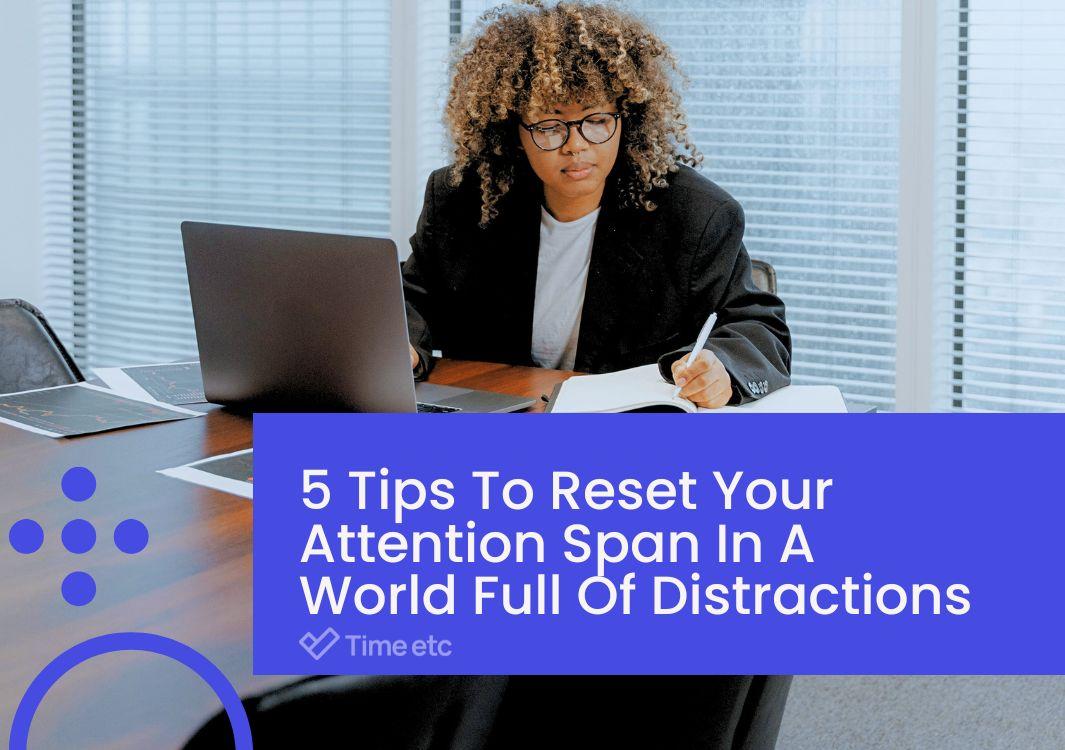If you’re a founder, chances are you’ve felt it—the creeping, crushing weight of overload.
One minute you’re juggling meetings, Slack messages, big decisions, and client requests like a pro. The next, you're staring at your to-do list like it’s written in a foreign language, unsure where to start… or if you even can.
Overload isn’t just common for founders—it’s practically a rite of passage. But that doesn’t mean it should be your default state. The more weight you carry, the more your leadership, your decision-making, and your overall well-being start to suffer. When you're in a constant state of reactive mode, you're not leading—you're just surviving. And let’s face it, that’s not sustainable for you or your business.
If you're feeling buried up to your neck right now, don't lose hope. There are practical ways out.
Here’s what to do when your workload feels completely unmanageable—and how to create space for clarity, focus, and calm again.

1. Pause, don’t push
When overwhelm sets in, your instinct might be to push harder—put in extra hours, skip breaks, or just grit your teeth and power through.
Ironically, that’s the opposite of what you actually should do. If everything starts feeling too much, the most productive thing you can do is… stop.
Literally.
Step away from work for at least two full days, back to back. Block your calendar, mute the notifications, and give yourself a full reset.
Yes, I know. Two days might feel impossible, maybe even irresponsible—but hear me out!
The reality is, the more you push yourself while you’re mentally and emotionally drained, the less effective you become. The “urgent” tasks will keep piling up, and your stress levels will climb. Your brain can’t work at its best under constant pressure—it needs time to recover.
Why this works
- Overload triggers your stress response: When you're juggling too many things at once, your brain shifts into survival mode. This is part of your natural stress response—your focus narrows, your thinking becomes reactive, and you're more likely to fall into short-term “firefighting” mode. You’re putting out urgent flames, but it’s hard to step back and see the big picture or plan ahead with clarity.
- Taking a real break helps reset your nervous system: When you pause—really pause, not just scroll through your phone—you give your body and mind a chance to slow down. Your breathing steadies, your heart rate eases, and your nervous system begins to shift from “fight or flight” to “rest and digest.” This reset helps bring your thinking brain back online so you can make thoughtful, strategic decisions instead of reacting to stress.
- You return with a clearer head and more energy: After a proper break, you’re not just rested—you’re recharged. Your mental bandwidth expands. You can zoom out, spot priorities more easily, and take action from a place of clarity instead of chaos. This is when your best ideas happen and your most effective decisions get made.
This break doesn't mean ignoring the urgency of the situation—it's about breaking the cycle of constant stress that keeps you trapped in a loop of overwhelm. When you return, you'll be in a better place to make decisions and prioritize what truly matters.
See: Why "Keeping Busy" Is A Problem For Entrepreneurs (And How To Solve It)
2. Offload as much as possible
When you're feeling overwhelmed, the fastest way to find breathing room again is to offload as much as you can.
It’s easy to get caught in the trap of thinking you have to do everything yourself to make sure it’s done right. But the truth is, trying to be across everything will just burn you out faster, and make you less effective in the areas that actually need your input.
Start by asking yourself:
- What’s currently on your plate that someone else could do 80% as well as you—or better?
- What have you been hanging on to that isn’t even in your zone of genius?
- What’s dragging your energy down but could easily be handed over with a short Loom video or SOP?
Whether it’s offloading to a team member or hiring a virtual assistant (VA), you don’t have to do it all to make sure it all gets done. Your role as a founder is not to be the most productive person in the room. It’s making sure the right things are done by the right people.
But what if you don’t have a team to offload to, or outsourcing tasks just isn’t an option right now?
This brings us to...
See: Why Doing Everything Yourself Is Costing You More Than You Think

3. Cut out low-value tasks altogether
Here’s the truth that so many learn the hard way: not everything needs to get done. Not even close.
Founders are often doers by nature. You’re wired to keep things moving. But some tasks are simply dead weight—things you’ve been doing out of habit, routine, or a misplaced sense of obligation.
So, take a hard look at all the tasks currently on your to-do list. Ask yourself:
- Just what would happen if I stopped doing this?
- Is this task truly making a difference in my business—or just filling time?
- Has this become a “zombie task”—something that was useful once but is no longer relevant?
And here’s the best part: if you cut something that turns out to be important, you can always bring it back later. But chances are, you won’t even notice it’s gone. In fact, you might find that your small business runs more smoothly without the burden of unnecessary tasks hanging over you.
4. Avoid perfectionism—aim for “good enough”
Perfectionism might look like high standards, but when you're overloaded, it becomes a trap. Instead of helping you do great work, the pressure to make everything flawless can add unnecessary stress and contribute to your sense of overload—slowing you down and holding you back even further.
Right now, the most helpful standard you can aim for is “good enough.”
This doesn’t mean slacking or delivering subpar work. It means asking: What can I simplify without sacrificing results?
For example:
- Can this update be five bullet points instead of a long email?
- Do we really need a 10-tab project plan for a small campaign?
- Would a rough draft or MVP (Minimum Viable Product) get the job done faster than waiting for perfection?
- Can we skip a few approval steps and empower the team to make the call?
Remember, perfection is almost always subjective, and sometimes the simplest solution is the best one, especially when you're working at or beyond your limit. In many cases, “good enough” can move you forward just as effectively, if not more so.
And don’t forget: automation is your friend here. Tools like Zapier, Notion templates, or even built-in automations in your existing tech stack can help you streamline repetitive processes and reduce the number of things you need to manually handle each day.
See: 3 Reasons Why Founders Fail (And 3 Reasons Why They Succeed)

5. Set boundaries around your availability
If you’re always available, you’ll never feel truly in control.
Being available 24/7 might feel like good leadership or a sign of a strong work ethic, but in practice? It invites interruptions, increases decision fatigue, and reinforces the idea that you’re the only person in your business who can solve problems. That doesn’t just drain your energy—it makes you the bottleneck in your own business.
Here’s the truth: you don’t need to be involved in every conversation to lead well. In fact, your team (and your sanity!) will benefit if you step back and create clear boundaries around your availability:
- Block 2–3 hours of deep focus time each day: No meetings, no Slack, no emails. Just uninterrupted time to do the kind of important tasks that only you can do.
- Set a communication cutoff time: For example, no Slack, email, or texts after 6 p.m. This helps protect your evenings for rest, family, or creative thinking.
- Batch your communications: Check your messages at set times during the day, like 10 a.m., 2 p.m., and 4:30 p.m., for instance. This prevents constant distractions from context-switching and gives you back more mental space.
- Encourage autonomy: Make it clear that your team can move forward without your sign-off on every little thing. The more they feel trusted, the more confident—and effective—they’ll become.
- Create decision thresholds: Only escalate decisions above a certain dollar amount, risk level, or strategic importance. This keeps you from being dragged into every tiny choice and empowers your team to take ownership over their tasks and projects.
This isn’t about being unavailable. It’s about being strategically available, so you can focus on the things only you can do.
The end result? A business that doesn’t fall apart when you’re offline or unreachable. Because that’s what real freedom looks like.
See: 5 Tips To Reset Your Attention Span In A World Full Of Distractions
What’s the bottom line?
Overload is a signal, not a sign of failure. It’s your brain and body’s way of telling you: Something has to change.
We may not always be able to avoid overwhelm entirely, but we can learn to address it effectively.
Remember, the most successful business owners aren’t those who never feel overwhelmed—they’re the ones who recognize the signs early, take decisive action, and come back stronger.
Putting these strategies into practice might feel uncomfortable at first. If you’re a founder, you’re probably used to pushing through, wearing all the hats, and carrying the weight of the business on your shoulders. Resting, offloading tasks, and setting boundaries can feel counterintuitive when hustling has always been your default mode.
But here’s the thing—sustainable success often requires a shift in mindset. You don’t have to do everything. You don’t have to be constantly stressed and overloaded to prove your commitment.
So if you’re feeling overwhelmed right now, take a breath. Step back. You’ve got options. And you don’t have to do this alone.
By stepping back, you’ll gain more clarity. By offloading, you’ll free up space. And by taking care of yourself, you’ll become a more focused, grounded, and impactful leader—not in spite of slowing down, but because of it.
Want to breathe easier and feel in control again?
That’s where we come in.
Since 2007, Time etc has helped over 22,000 founders carve out the time and headspace they need to focus on what they do best by matching them with outstanding virtual assistants to share their workload.
And because you already have a million things on your plate, we take care of everything behind the scenes—from sourcing top-tier talent to managing all the administrative and HR tasks that come with it.
So, no hiring headaches. No time wasted. Just reliable, personalized support from skilled professionals—at up to 90% less than the cost of hiring in-house.
Sound good?
Getting started is easy, just speak to our expert team. Let us know what you need and we’ll handle the rest!
Or, answer a few quick questions to receive personalized task recommendations tailored to your needs, and a $150 discount off your first month of virtual assistant support!









